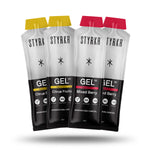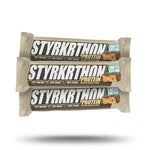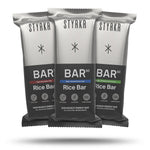Long-distance running is one of the most demanding sports both physically and mentally. We’ve all heard the stories of marathon runners who ‘hit the wall’. These days this is called ‘bonking’, presumably because it is a more visual description of what happens to a great many runners and endurance athletes in general - smacking their head against a wall.

Bonking/hitting the wall usually happens for one of two reasons, or both.
The first is mental exhaustion. We all know that feeling where your inner-motivational voice turns against you and starts asking annoying questions like “What’s the point?” and “How much further to go?” when you’ve completed 13 miles of a 26 mile race. It’s a battle.
The second, of course, is physical exhaustion. Your legs and arms get impossibly heavy, your breathing becomes tighter and you’re always reaching for more air, sweat runs into your eyes, your head spins, your knees burn, you feel like being sick and everything is screaming at you to stop. Running is punishing.
How can you prevent ‘hitting the wall’ or ‘bonking’?
Well, firstly, bonking can be prevented with proper training. Making sure you prepare your body physically so that it is used to the pressures and stress that long-distance running demands on your body. It is inadvisable (indeed often prohibited) to attempt a marathon or trail running event without training, even if you are in the best shape of your life. Running pounds your body and mind into submission. Even the elite are often seen on the roadside unable to carry on, and you’ve probably seen the videos of unbelievable sportsmanship as one runner physically carries another, whose entire body has turned to jelly, to the finishing line.  Additionally, you need to train on the right terrain with the right equipment. If the race is on mountain trails, it’s better to train on trails. If it’s on cement, train on cement. This way your joints can get used to the pressures and shocks of that terrain, and you can get the right trainers! Knee and ankle injuries, unsurprisingly, are the no.1 problem for runners, and a lot of the time it comes down to the wrong shoes.
Additionally, you need to train on the right terrain with the right equipment. If the race is on mountain trails, it’s better to train on trails. If it’s on cement, train on cement. This way your joints can get used to the pressures and shocks of that terrain, and you can get the right trainers! Knee and ankle injuries, unsurprisingly, are the no.1 problem for runners, and a lot of the time it comes down to the wrong shoes.
Another important weapon against ‘bonking’ is nutrition. If you’ve got a long-distance race coming up, you may be tempted to load up on as many macronutrients as possible before the event, and you’d be right to do so - as long as they are the right ones, in the right measure, at the right time.
Nutrition plans for long-distance running
Sir Mo Farah, the most successful track distance runner globally, shared his fuelling plan for the 2012 Olympics on BBC GoodFood. As you’d expect, it was full of complex and simple carbohydrates, protein, and healthy fats - or macronutrients.
He started his day with cereal and coffee, at lunch pasta with vegetables and grilled chicken, and then the same again for dinner. Protein shakes for muscle strength when resting and throughout training he’d drink a homemade sugary drink full of electrolytes rather than water, as water is sweated out all too quickly when on the run. When he needed a quick boost of energy, he preferred dark chocolate - he kept it simple and boring, as he openly admits.
That was 2012, and although this formula (and his intense training routine) brought him global success, ten years on sports nutrition has advanced to new levels and actually allows you to be a little more colourful with your meals.
As races become harder and longer, the demands on the athlete have become increasingly more intense and seemingly impossible. Yet, we still do it, and break records as we do.
How!?
Of course better training routines and more advanced equipment are certainly responsible for faster times and increased strength and stamina. But sports nutrition for running has evolved too. Getting your fuel plan adapted to suit you can and will make the difference between record personal performance and bonking out.

Let’s check out what the elite endurance runners say:
Ryan Sandes - The South African Trail runner
Ryan is a barbecue lover and doesn’t shy away from cold beer and pizza either. So, how does he compete and finish the gruelling trail races? Well, apart from having incredible mental motivation and a natural talent and passion for running, he does stick to a well-balanced and healthy diet, full of avocados, eggs and whole foods. And as the event approaches makes a point of getting his nutritional needs for the undertaking that awaits him.
“I believe it's important to enjoy life as well, I don’t weigh x amount of protein, and x of carbs, I just try to eat a balanced diet with as many whole foods as possible. I try to listen to what my body is craving.”
“Have something to eat about 90 minutes before the run but nothing too big… I normally have peanut butter and honey on toast and drink a sachet of rehydrate or the Gu Electrolytes. Make sure you are well hydrated before you start. Drink some electrolytes…”
During the race he says he takes on more liquids and uses gels to give him that boost when he needs it, again listening to what his body tells him.
Kilian Jornet - The Catalan Sky runner, Trail runner & long-distance runner
“I eat small sandwiches with jam and Nutella. And I eat gels during the last four or five hours of racing…I drink just water in long distance. How much depends on climatic conditions. Under normal, cool, European racing conditions, I drink one litre every two or three hours. The maximum I will drink if it’s very hot is between .7 litres and one litre per hour.”
Stephanie Bruce - The US long-distance runner
“The biggest rule I try to follow when it comes to diet and nutrition is viewing food as fuel. You want what you put in your body to serve a purpose for what you are asking of your body. For me I'm running between 90 and 115 miles a week on average and so I essentially am eating around the clock…What works for someone else, might not work for you…You have to find a diet routine that aligns with your lifestyle and is sustainable.”
When you take a look at her daily fuel plan you can see that there is a good combination of complex and simple carbs, healthy fats and protein; fruits, nuts, avocado, meat, snack bars, chicken, potatoes and plenty of vegetables. Pre-run she lightly snacks on a bowl of corn flakes with walnuts and raisins and a cup of coffee. Post-run she takes on fluids, both water and sports drinks, and eats a light bite such as veggies with hummus. In the evening she might have tacos, or chicken and vegetable stir-fry or gluten-free pasta. She doesn’t skip the naughty stuff either, a glass of wine and chocolate at the end of her day. That’s what works for her.
Emily Sisson - The US Marathon and half-marathon runner
“I haven’t made a huge jump in mileage—I typically run 90 miles per week, and now I’m running around 100—but a big change I’ve made is that I’m now experimenting with gels and sports drinks to fuel my runs.”
Before and after her workouts, Sisson sticks to a homemade meal routine that’s well-balanced and not too restrictive.
“I’ll eat a really simple mix of carbs, veggies, and protein. I like to cook big batches of quinoa, farro, and rice and use them in grain bowls throughout the week. Along with the grains, I’ll toss in whatever veggies are in my fridge—such as red pepper, zucchini, and spinach—plus some protein like scrambled eggs or grilled chicken. It’s nothing too fancy, but it’s filling. If I’m craving something more carb-heavy, I’ll make pancakes (I love the Kodiak Cakes mix) and have those with a salad…Fuelling properly is key for recovery and injury prevention. I know that when I’m hungrier on certain days more than others, it’s my body’s way of telling me it needs more fuel.”
From these fuelling plans, and sports nutritionist advice, we can take note of a few key elements and answer some FAQs.
What should I eat before running?
Some simple carbs, caffeine and a hydration sports drink. All the above runners are in agreement that you need to give your body (and mind) some simple carbs which can easily be converted into glucose without making you feel bloated. Hydration is emphasised as a priority too. Water works obviously, but as it is chemically-constructed simply it is easily lost from the body as sweat. Therefore, many runners choose hydration satchels to add to their water bottle to provide their body with electrolytes which will keep the body in balance and keep you hydrated for longer periods.
What shouldn’t I eat before running?
Complex carbs, heavy foods in general. It’s self-evident that if you have steak and chips and a bowl of pasta before running all day you’re going to feel fat. Complex carbs are important for your fuel plan but they are hard to break down and convert into energy. If you eat complex carbs before you run you’ll create GI tract issues such as indigestion and bloating, which of course will create problems to your performance. Complex carbs should be in your fuel plan, but consumed plenty of time before you head out the door.
What are complex carbohydrates?
Complex carbohydrates are foods which have long strings of sugar molecules. Pasta, potatoes, brown rice, quinoa and bread are excellent sources of energy but require a longer digestion time. They are an essential part of any runner's nutrition plan but are not ideal just before running.
What are simple carbohydrates?
Simple carbohydrates are foods which have only one or two sugar molecules. They are easily broken down and quickly converted into glucose and, consequently, energy. Fruits such as bananas, berries, and apples as well as nuts and seeds are all great sources of simple carbs. Simple carbs can be eaten before and during a long-distance running event. They will give your body a boost of energy.
What are macronutrients?
Macronutrients are protein, carbohydrates and fats. They each have an important role in nutrition for running, and sports in general. You can read more about each here.
What are sports gels?
Sports gels are specially designed, easy-to-use and lightweight sources of energy. They have become increasingly popular for endurance athletes and professional sportspeople alike due to their energy-boosting effect and their portability.

Are sports gels safe?
100%. They are made using natural sources and are suitable for all age groups.
Is caffeine a good idea before running?
Yes. As long as you drink it a suitable amount of time before you get running. Caffeine stimulates your body and increases both your speed and power. It also improves neuromuscular coordination; your brain can tell your muscles to contract and relax more efficiently. Caffeine gels can be taken easily on-the-go.
How much water should I drink before and during a race?
Hydration is key to success. A rule of thumb is if you feel thirsty, drink. However, some drinks are better at keeping you hydrated than others. Fizzy drinks should be avoided although they are full of sugar. Your hydration needs depend on the climate in which you are running. Obviously if it is hot, you need to drink more and more regularly as your body will sweat more. Just under a litre an hour. For cooler climates you can reduce this to 1 or 2 litres every 2 or 3 hours. Dehydration is to be avoided at all costs. Pre-race and during it is a good idea to feed your body electrolytes, which can be found in sports drinks and dissolvable powders, as they will keep you hydrated longer.

Why do I get GI tract problems when I run?
You’ve probably got your fuel plan wrong. GI tract issues are caused by indigestion and/or an overload of a particular sugar. You should avoid eating complex carbs at least 3 hours before you run, reduce/cut out acidic foods and drinks, don’t consume super-sugary foods while on-the-go, stay hydrated, and monitor your overall diet. If you start suffering from an issue mid-race you should slow down, sip fluids and eat something bland (think white foods such as a rice cake).
Clearly training, mental strength and stamina are the areas in which you need an abundance of if you are planning a marathon, a trail run, ultra-marathon or any other endurance race. However, getting your fuel plan right and giving yourself the nutrition you need to run long-distance can and will give you an extra gear and improve your running performance and recovery, whilst reducing the chances of having problems or discomfort. What works for one may not work for another, so you need to get your nutrition plan adapted to what suits you.


